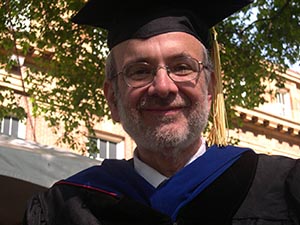
Built in 1903 of stone in the neoclassical style, the imposing New Brunswick Free Public Library, located on 60 Livingston Avenue, houses an extensive collection of books, periodicals, and media, as well as many other reference materials, and offers innovative programs and services to support the local community, including free English language programs; income tax filing assistance; birth certificate translation services; career searching advice; and much more.
The head of this operation is the library’s director, SC&I alumnus Robert Belvin, Ph.D.’06. Describing himself as (possibly) the oldest library director in New Jersey (he’s 76 soon to be 77) and (most likely) currently the longest-serving library director (34 years), he said he still enjoys his job.
Crediting the library’s success to the hard work and dedication of his staff, many of whom are also SC&I grads, Belvin said, “The secret of survival in academic programs is to realize that the support staff are the ones who understand how the place works. When your career continues, respect your staff, praise them, and let those outside know how important they are. Remember that your success is totally dependent on what your staff does.”
In addition to hiring and working with many SC&I graduates, Belvin has also been married for 39 years to SC&I alumna Maureen Toole MLS’88, who retired last month after working for 36 years (June 1, 1988 to December 1, 2024) as a librarian at the Monmouth County Library. The Belvins have four sons.
After earning a bachelor’s degree in history from Wagner College and a Master of Library Science from the Pratt Institute, Belvin first studied at SC&I as a post-master’s student for two years, from 1975 to 1977. He then enrolled in the SC&I Ph.D. program in 1987.
“I finally finished my Ph.D. in 2006,” Belvin said. “Betty Turock had called me up the previous September and said she was retiring and that I would finish. One other characteristic of Betty (also Tefko Saracevic) is that they were simply incapable of comprehending the words ‘No’ or ‘I can't.’”
Professor Emerita of Library and Information Science Betty Turock said, "Bob was a first-rate Ph.D. student who went on to become a leader among New Jersey’s library directors. The way in which he has developed the New Brunswick Free Public Library brings credit not only to Bob and his staff, but also to Rutgers University and its School of Communication and Information. How proud I am of him and also to find myself among those he cites as having lasting impact on his education and the way he has chosen to serve the diverse community who make their homes in New Brunswick."
Read our Q&A to learn more about Belvin’s successful and inspiring career, the best advice he received from the faculty at SC&I, his favorite collections, and more.
Did any SC&I classes and/or instructors have a profound and lasting impact on you, and if so, why?
BB: From my post-master’s work in the 70s, I had learned from Dr. DeProspo that measuring service was a challenge and never assume your numbers are reality. In the Ph.D. program, Betty Turock, Tefko Saracevic, Lea Stewart, and Carl Botan had the most impact. Betty for her commitment to diversity and her intensity in teaching, actually her intensity in everything! Tefko for the fact you could be brilliant but also human -- he took care of the Ph.D. students he dealt with. Carl for teaching that sharing glory doesn't cost you anything. Lea for helping me understand that what you said was not as important as what people heard you say and for being a great, caring person.
Crediting the library’s success to the hard work and dedication of his staff, many of whom are also SC&I grads, Belvin said, “The secret of survival in academic programs is to realize that the support staff are the ones who understand how the place works. When your career continues, respect your staff, praise them, and let those outside know how important they are. Remember that your success is totally dependent on what your staff does.”
What is some advice you received at SC&I, Rutgers, or elsewhere, that has served you well and/or advice you'd like to share with current or prospective SC&I students about how to succeed at Rutgers and professionally?
BB:
- Reward your staff’s dedication and determination even if it broke the rule you thought was so important.
- Your organization has an image. The more positive the image, as long as it connects to reality, the more likely the reality will catch up to the image. In other words, if you can convince people your organization will succeed, the greater the probability that you will succeed.
- You are not the smartest person in the room. I went to a science high school, Stuyvesant in Manhattan, and quickly learned that. (Getting a Ph.D. meant that I was not a total failure compared to my high school classmates.)
- If you end up working in an urban library, don't forget to laugh -- the only alternative is crying.
 What are some of the most rewarding aspects of your job?
What are some of the most rewarding aspects of your job?
BB: Helping my staff help people. It can be anything from making sure that we can tell someone what agency in State government they should call for help with their problem to arranging the funding for an eclipse-watching party to helping staff hold a Holi Festival so people in New Brunswick can learn about another culture.
What are some of the most challenging aspects of your job and how do you address them?
BB: In an urban library, the staff has to handle an incredible range of people and problems. It can range from someone who will not obey rules not to vape in the library, to someone who is having a mental illness episode, to a teenager who runs across tables for a $20 bet, to administering Narcan. The challenge is to focus on the 99% of patrons who want to use our resources properly from borrowing a mystery to sitting quietly in a warm place on a frigid day to getting their taxes done by some nice volunteers from Rutgers to having their child sit in a bilingual story hour to an adult improving their conversational English. Sometimes the only choice is laugh or cry and I try to encourage laughter.
The other challenge is to get our story out. And that has two prongs. We cannot serve the public without financial resources and that means that we have to make it clear to those who allocate taxpayers' money that we do a good job and are providing the maximum service for the funding the library gets. The other prong is that many people, especially those who did not grow up using public libraries do not know what services the library provides. We need to explore all the communication channels that people use, not just legacy media and social media and see how we can utilize those channels.
Which collection(s) at the library is/are your favorite(s) and why?
BB: I started as a part-time clerk at the New York Public Library's Donnell Library Center in 1968. By chance, I got assigned to the Young Adult (teen) Library. I became fascinated by the challenge of serving teens -- children get brought to the library, you have to convince teens to continue to read and to use the library, so my favorite section is the Teen Collection. Second is the local history collection. I am fascinated by the rich history of New Brunswick and one of my other hats is being President of the New Brunswick Historical Society.
Learn more about the Ph.D. Program at the Rutgers School of Communication and Information on the website.
Photos: Courtesy of Robert Belvin
